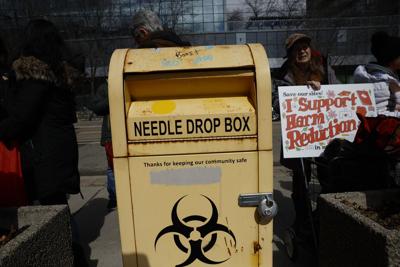A decision to prohibit sterile needle distribution at the provinceÔÇÖs ╔ź╔ź└▓less and Addiction Recovery Treatment Hubs will put more people at risk of HIV and Hepatitis C transmission, says a coalition urging the government to reverse its policy.
More than 600 individuals and organizations sent to Ontario Health Minister Sylvia Jones on Monday. The signatories say the policy is not evidence-based and could discourage vulnerable Ontarians from accessing other health-care services offered at HART Hubs.
While itÔÇÖs too early to say if the elimination of needle distribution services at HART Hubs as of April 1 is leading to higher transmission rates, experts say they’re anticipating that will be the outcome and that they’re hearing it’s already more difficult to access sterile needles in the city.┬á
The provincial Community Care and Recovery Act (CCRA), passed in December, requires existing supervised drug consumption sites to be at least 200 metres from schools and daycare centres. As a result, nine sites, including four in ╔ź╔ź└▓, were and were allowed to convert into HART Hubs, which prioritize treatment, recovery and getting people into housing.
The act, which is being challenged in court, also introduced restrictions on needle distribution at HART Hubs. Sandra Ka Hon Chu, co-executive director of the HIV Legal Network, said the governmentÔÇÖs policy goes against its own guidelines and advisory committees.
She pointed to a 2018 Substance Use Prevention and Harm Reduction Guideline by OntarioÔÇÖs then-Ministry of Health and Long-Term Care, which instructs boards of health to ÔÇťprovide or ensure the availability of sterile needles and syringes, as well as safer drug use supplies.”
The letter includes signatures from health centres, including some that transitioned to HART Hubs, HIV/AIDS and Hepatitis C advocacy groups and research organizations. 
In a statement, Ema Popovic, press secretary for the health minister, said “Our governmentÔÇÖs focus is on offering people struggling with mental health and addictions challenges a pathway to treatment, not giving them tools to use illicit drugs.ÔÇŁ
Needle and syringe programs allow people to access sterile syringes and injection equipment and also safely dispose of used needles and syringes. They┬áhave ÔÇťone of the best records of all measures to reduce harm,ÔÇŁ said Jurgen Rehm, senior scientist at the Centre for Addiction and Mental HealthÔÇÖs Institute for Mental Health Policy Research.
ÔÇťWe know from research in more than 30 countries ÔÇŽ that sterile needles actually provide a way to reduce infectious diseases, abscesses and link people who use drugs to services.”
Needle distribution programs not only reduce transmission of HIV, viral hepatitis and other blood-borne sexually transmitted diseases, but also endocarditis, an infection of the heart valves, Rehm said.
ÔÇťThe treatment of the diseases I’ve just listed costs a lot of money to society,” Rehm said. “So no matter about the moral implications, there’s also a clear indication that needle and syringe programs overall are cost-effective.”
People at greatest risk would be low-income individuals who are unable to acquire needles elsewhere, such as at pharmacies, Rehm added.
Gillian Kolla, a drug policy and harm reduction researcher and assistant professor of medicine at Memorial University, interviewed 32 people in ╔ź╔ź└▓ affected by the closure of supervised consumption sites in May.┬á
She said sheÔÇÖs already hearing from people that itÔÇÖs harder to access sterile needles and syringes. While other organizations distribute sterile needles and syringes, many people donÔÇÖt know about them because the harm reduction sites they attended were their primary point of contact for health services, she added.





























To join the conversation set a first and last name in your user profile.
Sign in or register for free to join the Conversation